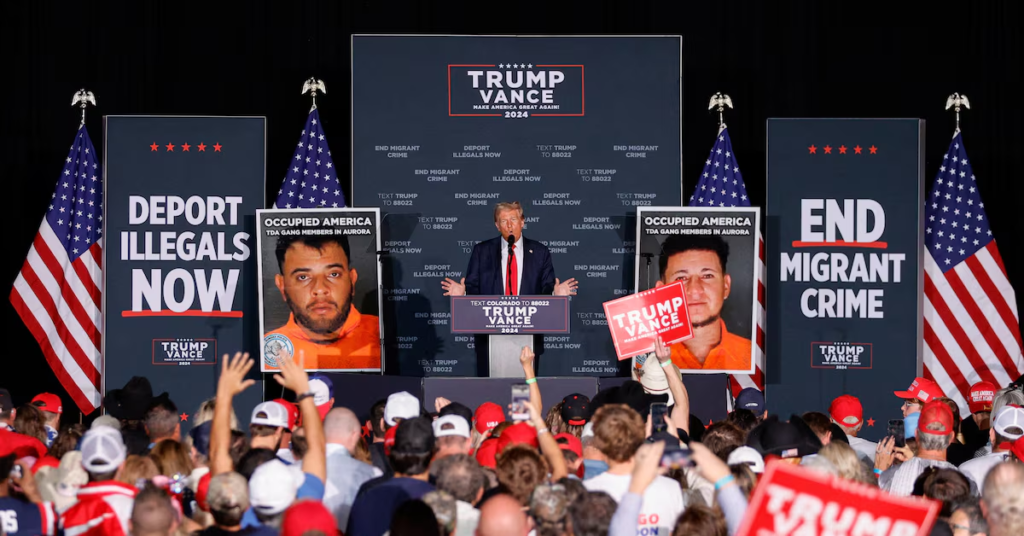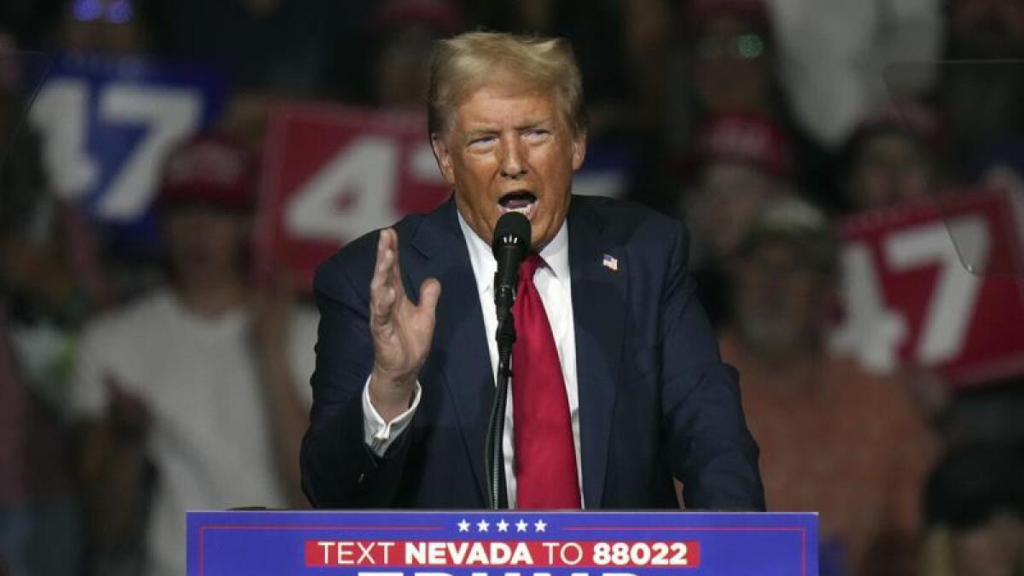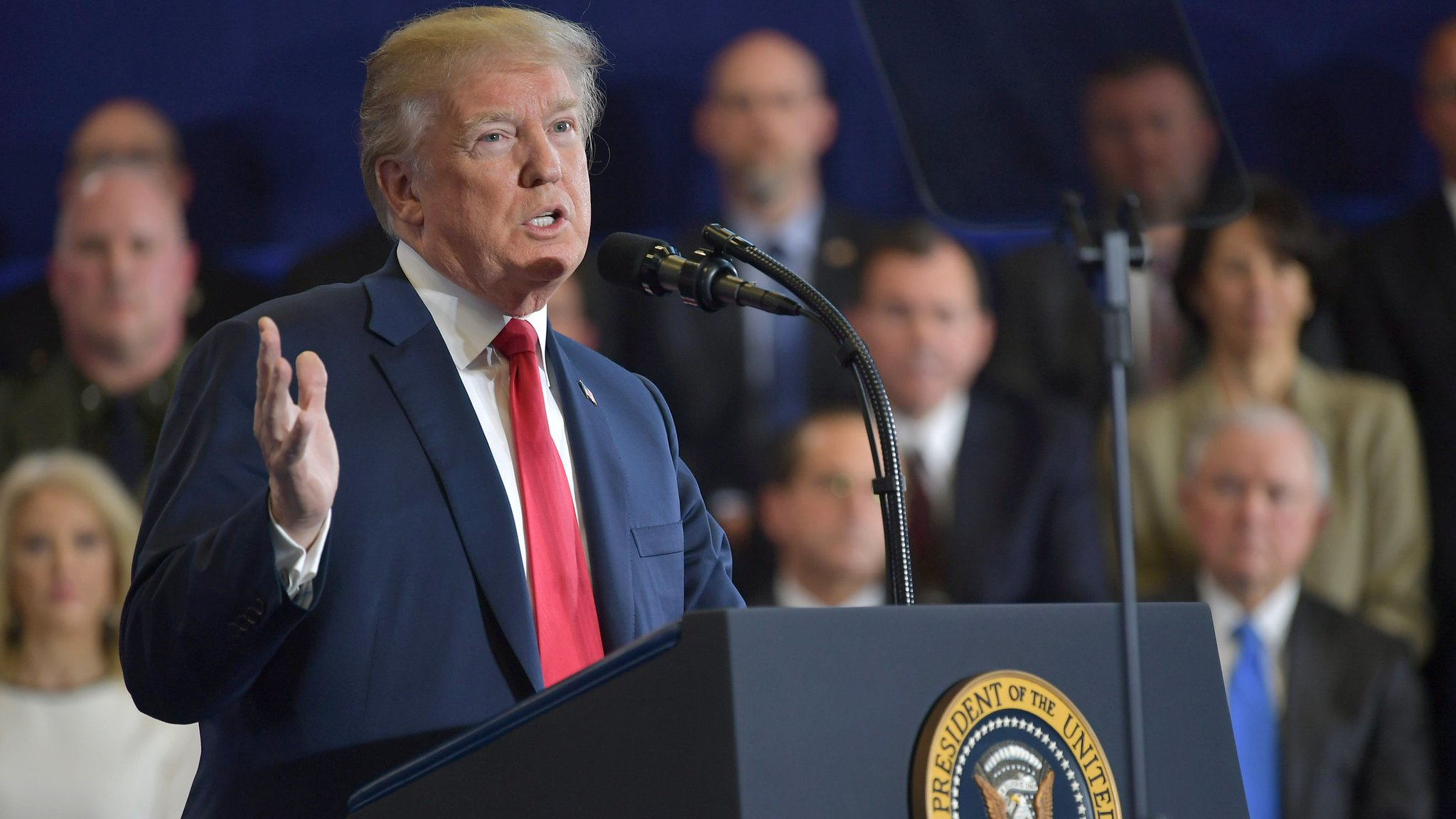In a heated campaign rally in Reno, Nevada, former President Donald Trump made a bold and controversial statement, calling for the death penalty for migrants who kill U.S. citizens and law enforcement officers.
This stance echoes Trump’s longstanding views on immigration, law enforcement, and his tough-on-crime rhetoric, further intensifying as he campaigns for the 2024 presidential election.
His remarks have sparked strong reactions from both supporters and critics, as Donald Trump continues to target immigration policies and the current administration’s handling of border security.
Trump’s Call for Death Penalty Against Migrants
During his campaign rallies in both Reno, Nevada, and Aurora, Colorado, Donald Trump delivered a message that has reignited debates over immigration and criminal justice. At the forefront of his speech was a direct call for the death penalty for migrants who kill American citizens or law enforcement officers.
Read : Biggest Tariff Charger of All Is India, But They Do It With a Smile: Donald Trump
“I’m hereby calling for the death penalty for any migrant who kills an American citizen or a law enforcement officer,” Trump proclaimed to his audience, drawing applause from supporters who view him as a champion of law and order.
Read : Trump Challenges Biden to Golf Match with $1 Million Charity Bet
This isn’t the first time Trump has advocated for the death penalty as a solution to issues he associates with illegal immigration. Throughout his presidency and beyond, Donald Trump has often linked crime with migration, particularly emphasizing the danger he believes is posed by undocumented immigrants entering the United States.
In the past, he has also called for the death penalty to be used against human traffickers and drug traffickers, further solidifying his position as a proponent of capital punishment in cases involving crimes he deems especially harmful to Americans.

Trump’s tough-on-crime approach, particularly in the context of immigration, has been central to his political identity. His supporters view this stance as a necessary step to protect the country, while his critics argue that such rhetoric unfairly targets migrants and ignores the complexities of immigration and criminal justice.
By doubling down on this issue during his 2024 campaign, Donald Trump is clearly aiming to rally his base and differentiate himself from the current administration’s immigration policies.
Anti-Immigrant Rhetoric Amid 2024 Campaign
As Donald Trump seeks to return to the White House, his rhetoric surrounding immigration has become increasingly aggressive. In his rallies, Trump has consistently portrayed migrants as a threat to the safety and well-being of American citizens, a tactic he has used since his first campaign in 2016.
His comments at the Reno and Aurora rallies are no exception, as he continues to frame immigration as a national crisis that requires immediate and drastic action.
At the Aurora rally, Donald Trump took aim at Vice President Kamala Harris, whom he labeled the “border czar,” placing the blame for the current state of immigration at her feet. He accused Harris and the Biden administration of failing to secure the border, allowing what he described as an “army of illegal alien gang members and migrant criminals” to enter the country.
According to Donald Trump, these migrants come “from the dungeons of the third world” and are responsible for the destruction of American cities, particularly cities like Aurora, Colorado.
Trump’s claim that Aurora has been “invaded and conquered” by gang members from Venezuela is part of his broader narrative that links illegal immigration to crime and violence.
By positioning himself as the candidate who will “rescue” cities that have been affected by migration, Donald Trump is appealing to voters who feel that their communities have been neglected or harmed by current immigration policies.
This message has resonated with his base, many of whom see Trump as a leader willing to take strong, decisive action to protect the country.

However, critics argue that Trump’s rhetoric is inflammatory and dangerous, as it perpetuates harmful stereotypes about immigrants and fuels xenophobic sentiments. They contend that Trump’s focus on crime and migration oversimplifies the issue and ignores the contributions of immigrants to American society.
Furthermore, they point out that most studies show no clear link between immigration and an increase in violent crime, challenging Trump’s assertions about the threat posed by migrants.
The Broader Impact of Trump’s Immigration Policies
Trump’s calls for the death penalty in cases involving migrants highlight the broader direction of his immigration policies, both during his presidency and in his current campaign.
As president, Donald Trump implemented a series of hardline immigration measures, including the controversial family separation policy, the construction of a border wall, and restrictions on asylum seekers.
These policies were designed to reduce the number of migrants entering the U.S. illegally, but they also sparked outrage from human rights organizations and advocacy groups who condemned them as inhumane.
Trump’s recent remarks suggest that, if elected again, he would continue to pursue similarly strict immigration policies. His promise to impose the death penalty on migrants convicted of killing Americans is a significant escalation of his previous policies, which focused more on deportation and detention rather than capital punishment.
This shift reflects a growing emphasis on punitive measures within Trump’s broader law-and-order agenda, appealing to voters who prioritize security and believe that harsher penalties are necessary to deter crime.
At the same time, Trump’s statements raise important questions about the ethics and effectiveness of such policies. The use of the death penalty in the U.S. remains a deeply divisive issue, with opponents arguing that it is inhumane, costly, and disproportionately affects marginalized communities, including racial minorities and the poor.
Applying the death penalty to migrants specifically could exacerbate these concerns, leading to accusations of discrimination and further inflaming tensions over immigration.

Moreover, legal experts have questioned whether Donald Trump’s proposal would even be feasible under current U.S. law. The death penalty is typically reserved for the most serious offenses, such as premeditated murder, and it is unclear how Trump’s plan would align with existing legal frameworks.
Any attempt to implement such a policy would likely face significant legal challenges, particularly given the ongoing debates over the constitutionality and morality of capital punishment.
Despite these challenges, Trump’s base has remained steadfast in their support for his immigration agenda. For many of his supporters, the promise to crack down on crime and secure the border is a key part of his appeal.
Trump’s ability to tap into these concerns has been a major factor in his political success, and his recent calls for the death penalty are likely to energize voters who feel that the current administration has failed to address the issue of illegal immigration.
As Donald Trump continues to campaign for the 2024 presidential election, immigration will remain a central focus of his platform. His harsh rhetoric and proposals reflect his belief that the U.S. must take extreme measures to protect its citizens and preserve its way of life.
Whether or not his calls for the death penalty gain traction, they underscore the high stakes of the immigration debate and the deep divisions that continue to define American politics on this issue.

